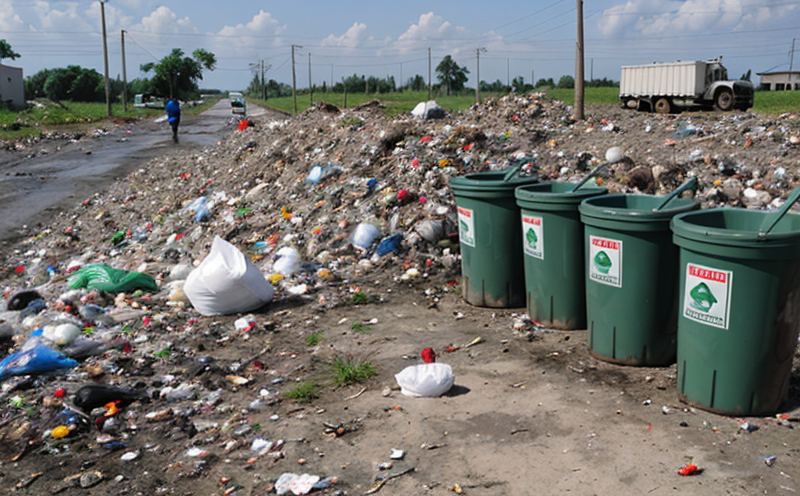EN 16170 Trace Elements in Solid Waste Test
The EN 16170 standard is designed to determine trace elements present in solid waste samples. This test ensures that the concentration and presence of these elements do not pose a risk to human health or the environment. Trace elements such as lead, cadmium, mercury, arsenic, chromium, nickel, copper, zinc, and others are analyzed for compliance with environmental regulations.
The methodology involves several steps including sample collection, preparation, digestion, and analysis using various instrumental techniques like inductively coupled plasma optical emission spectrometry (ICP-OES) or inductively coupled plasma mass spectrometry (ICP-MS). The test is crucial for waste management companies, recycling facilities, and manufacturers who handle hazardous waste to ensure regulatory compliance. Compliance with this standard helps prevent environmental pollution and ensures the safety of workers involved in waste handling.
The importance of trace element testing cannot be overstated, particularly in the context of landfills and incineration plants where waste is processed. Trace elements can have significant impacts on soil, water bodies, and air quality if not managed properly. The test results are used to inform decisions regarding waste treatment methods and disposal practices.
Understanding trace element concentrations also aids in recycling processes by identifying potentially harmful materials that could contaminate recovered resources. This knowledge is vital for the circular economy movement, promoting sustainable resource use and minimizing environmental impact.
The EN 16170 test ensures that waste management practices are aligned with international standards such as ISO 9241-12, which provides guidelines on how to measure trace elements in solid waste. Compliance with these standards not only enhances the credibility of a facility but also supports its reputation for environmental stewardship.
By conducting this test, facilities can demonstrate their commitment to sustainability and meet regulatory requirements set by organizations like the European Union’s Waste Framework Directive. This directive emphasizes the importance of trace element testing in preventing illegal waste dumping and promoting safer disposal practices.
In summary, the EN 16170 test is a critical tool for ensuring that solid waste management processes are environmentally responsible and compliant with international standards. It plays a vital role in safeguarding public health and protecting the environment from harmful substances found in waste streams.
Benefits
Ensures compliance with international standards like ISO 9241-12 for trace element analysis in solid waste.
Aids in identifying harmful substances that could contaminate the environment or affect public health.
Supports sustainable waste management practices by preventing illegal dumping and promoting safer disposal methods.
Enhances the reputation of facilities for environmental stewardship, which is crucial for gaining stakeholder trust.
Provides accurate data that can inform decisions on waste treatment processes and recycling initiatives.
Makes it possible to comply with regulatory requirements set by organizations like the European Union’s Waste Framework Directive.
Facilitates safer handling of hazardous materials, reducing risks to workers and the environment.
Eurolab Advantages
Eurolab offers state-of-the-art facilities equipped with advanced instruments for trace element testing. Our team of experts is well-versed in European standards like EN 16170, ensuring accurate and reliable results. We pride ourselves on delivering timely reports that are compliant with international regulations.
Our commitment to quality extends beyond mere compliance; we aim to exceed expectations by providing detailed insights into trace element concentrations. This allows our clients to make informed decisions about waste management practices. Eurolab’s reputation for excellence is built on years of experience and a track record of delivering accurate, reliable results that are trusted across the industry.
Our services include not only testing but also expert advice on how best to manage trace elements in solid waste. We offer tailored solutions based on each client's specific needs, ensuring that they stay compliant with all relevant regulations while minimizing environmental impact.
International Acceptance and Recognition
The EN 16170 test is widely recognized internationally for its stringent approach to trace element analysis in solid waste. This standard is accepted by regulatory bodies across Europe, the United States, and other regions that prioritize environmental protection.
Regulatory authorities such as the European Commission and national governments rely on this testing method to ensure that waste management practices meet high standards of safety and sustainability. The widespread acceptance of EN 16170 reflects its importance in promoting global efforts towards reducing pollution and protecting natural resources.
Countries like Germany, France, Italy, Spain, the United Kingdom, and others have implemented this standard as a key component of their waste management strategies. By adhering to these guidelines, facilities can demonstrate their commitment to environmental responsibility on both local and international scales.





